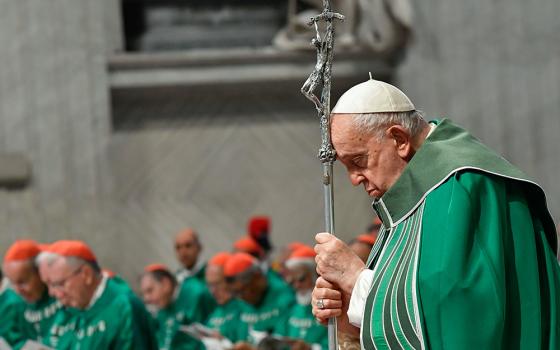
Italian Jesuit Fr. Giacomo Costa, adviser to the secretary-general of the Synod of Bishops, speaks at a news conference at the Vatican Oct. 27, 2022, to present the document for the continental phase of the synod on synodality. (CNS/Junno Arocho Esteves)
One of the chief organizers of the Vatican's high stakes summit on the future of the Catholic Church believes that synodality must be distinguished from the work of diplomacy.
"We didn't want to be diplomatic," said Italian Jesuit Fr. Giacomo Costa, describing the experience of the monthlong Vatican synod that brought together some 450 delegates from all over the globe. "We wanted to include all voices in an atmosphere of trust that together aims to discover what God calls us to. This is the synodal methodology and the path that God calls us to."
Costa, who served as a special secretary during the Vatican's October 2023 synod on synodality, made the comparison of the recent COP28 U.N. climate conference, which he noted brought together thousands of leaders and advocates in an effort to reach a final consensus among participants.
The synod, by contrast, was not a time for "winners and losers" nor a time for "debating issues in an already polarized church." Instead, said Costa, it was a liturgical, prayerful event where the aim was to better understand each other's ideas and experiences.
Advertisement
The Jesuit priest's remarks came during a Dec. 13 virtual symposium organized by the International Union of Superiors General (UISG), an umbrella group representing some 450,000 sisters and nuns around the world, where synod delegates were invited to discuss the implications of the synod's final report.
Costa, who spoke to an online audience of more than 200 sisters from places as geographically diverse as New Delhi, Australia and Mexico, insisted that although the synod produced a synthesis document, "no document can really describe" the experience of what took place here in Rome during the monthlong summit.
In introducing Costa, Sacred Heart of Jesus Sr. Maria Cimperman noted that the online discussion was one of the first events to take place following the Dec. 12 update from the Vatican's synod office announcing the timeline of events between now and the second session of the synod in Oct. 2024.
The goal is "not going back" to where the synod began in 2021, but to invite people, and especially local churches, to create spaces for conversation in light of the synthesis report, said Cimperman, who oversees synodal initiatives for the UISG.
Among the next steps, according to synod organizers, they will now ask Pope Francis to authorize studies on the need to update canon law, the rules for priestly formation and a deeper reflection on the diaconate, including the possibility of ordaining women deacons, as well as the possibility of revising a document that provides norms for the relationship of a bishop with members of religious orders in his diocese.
Representatives from every continent, along with the Vatican dicastery officials, are expected to work together to examine such issues, with a report on the progress of such work to be presented at the second session of the synod next October.
In his own reflections on the month ahead, Costa said that the themes and questions raised by the synod's synthesis report, must be examined theologically, pastorally, canonically and scientifically in order to deepen the analysis of such topics.
Among the many other issues raised in the synthesis, which remain on the table for discussion is how to best appreciate the differences in local churches, while preserving the unity of the whole church; the proper role of a bishops' conference; and deepening ecumenical relations.
Such a synodal process of engaging these questions, he said, will demonstrate that the "church in its ordinary life listens to people and engages in evangelization."







